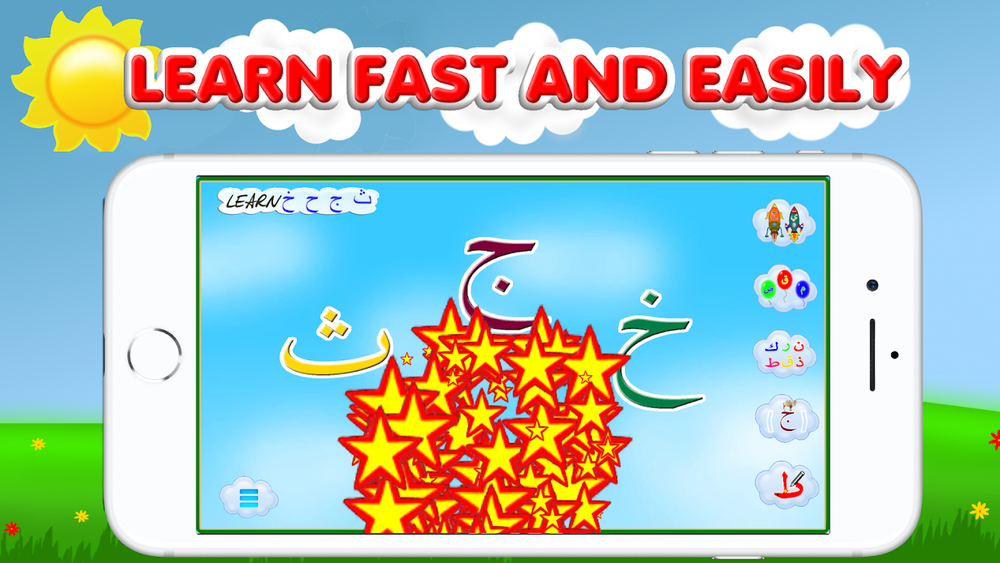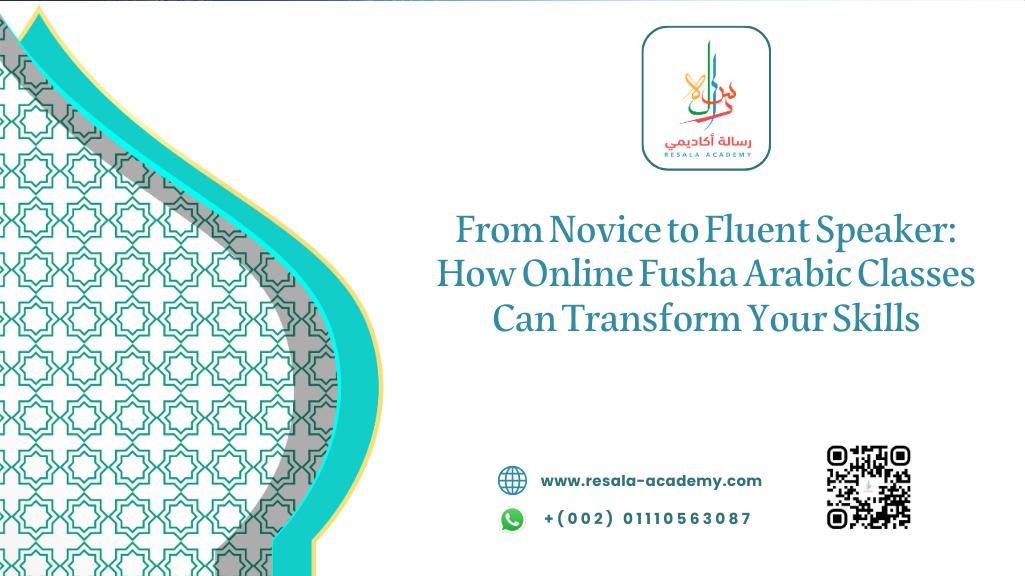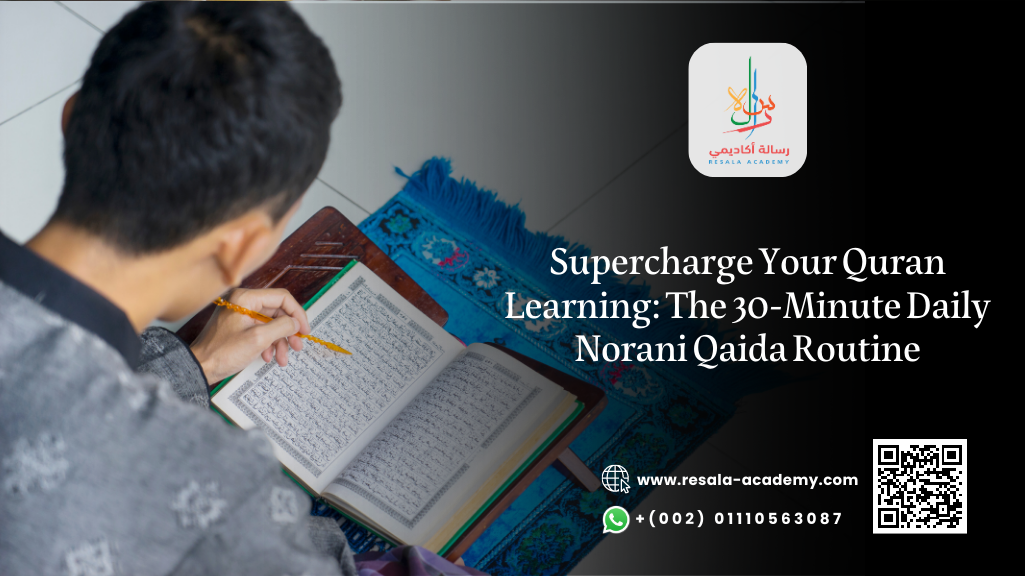Arabic is one of today’s most significant languages in the world. Indeed, in a region that spreads across different countries and continents around the globe, almost 300 million Arabic speakers practice it every day.
Arabic is among the world’s 10 most widely spoken languages. You want to learn Arabic in the fastest possible way, of course, right?
In this daring objective, Resala Academy wants to help you to succeed. You should know that the Arabic language, both in its form and structure, is very distinct from English before you start.
The Arabic alphabet is totally different from the one used in French, German, Spanish and Portuguese, the main European languages. This makes the Arabic script unlike anything that is used by native English speakers.
What’s more, in the Middle East and North Africa, Arabic differs between different countries.
Each country has its own specific dialect, meaning that depending on which country you are in, some of the Arabic words, phrases and expressions used will be different.
There are two different types of written Arabic to make it even more difficult. Modern Standard Arabic is one of them, and Classical Arabic is the other.
Fortunately, the difference between these last two is very small, and they are used almost interchangeably by most Arabic speakers.
How to Learn Arabic: The Basics
Written Arabic differs, as we have just mentioned, from spoken Arabic. Consequently, you must be careful not to confuse the two.
In the media, the press and most books, Modern Standard Arabic is widely used. Any product with an international audience, basically. Classic Arabic is what is used in the Quran, the Islamic Holy Book.
Wanting to master all aspects of Arabic is synonymous with a very long process and a lot of work that is sure to take years and a lot of Arabic courses.
You can have success on your side and not waste too much of your motivation by focusing on a goal such as learning modern literal Arabic.
Features of Our Courses
We offer our students high-quality Arabic and Quran at affordable prices that meet their budget. All our teachers are from Egypt so Arabic is their mother tongue.
Best Industry Leaders
We are top-rated academy on Google & Trustpilot.
Learn Online at Your Own Pace
We help you and your kids to learn Quran from home.
Professional Certification
For each level you complete we issue a certificate of completion.
You can’t choose any edition. In order to learn Arabic, it’s better to buy a Trusted Edition.
This language differs from French, English, Spanish or German, so when learning Arabic, it is essential to have a grammar book with you at all times, particularly if you are a beginner.
Here are some recommended books:
- Let’s Talk Arabic: Second edition (Arabic Edition)
- Alif Baa: Introduction to Arabic Letters and Sounds [With DVD]
- Arabic for Nerds: 270 Questions on Arabic Grammar
- Arabic for Dummies: a Beginner’s guide to Arabic
Choosing Online Resources
When it comes to learning the Arabic language, the internet is a great breeding ground for significant tools. In your learning adventure, certain online programs and guides may assist you.
To help you learn Arabic online, here are some free tools that you can focus on:
- Arabic Speak 7: This is an online language-training program created to help with Arabic grammar.
You will find lists of verbs, pronouns, words, and other useful sentences with clear and simple instructions on how to memorize them. - Salaam Arabic: This is a very well designed site offering various free guides for learning Arabic.
Each lesson is divided into categories, namely, days, numbers, religion, polite formulas, subjects, pronouns, and so forth…There are also seven grammar sections for beginners and intermediate students.
Basic Vocabulary Knowledge
You must first learn basic daily words to learn Arabic quickly, which could help with conversation and comprehension.
Make yourself familiar with some basic Arabic words, like “marhaban” for hello, “ma’a ssalamah” for goodbye, “aahlan wa sahlan bika” for welcome, “kabeer” for big, “sagheer” for small, “Alyawn” for today, “akala” for eating, or “dahaba” to go.
Apps such as Duolingo are great for learning Arabic vocabulary on the go on your smartphone.
It’s one of the foundations for fast and effective Arabic learning. Without knowing its origin, it’s impossible to speak the Arabic language. The letters in the Arabic alphabet and the written texts are read from right to left. Some sounds are found in Arabic and not the English language, and vice-versa.
Use websites like Salaam Arabic to memorize the singular alphabet. They have audio pronunciation guides to help you step by step in the pronunciation of each letter.
Note that the vowels are not written in Arabic but are represented by symbols known as “fathas.”
Learn From Industry Leaders
We are top-rated academy on Google & Trustpilot.
Learn at Your Own Pace
We help you and your kids to learn Quran from home.
Professional Certification
For each level you complete we issue a certificate of completion.
Create sheets of vocabulary
The best way to learn a foreign language–and especially Arabic, which is deemed difficult–is to memorize Arabic vocabulary. An effective way to do this is to write thematic vocabulary word lists on worksheets or flashcards.
Simple exercises, such as writing down a list of vocabulary words around a certain topic or sentence structure, can be very helpful.
The advantage is that these cards don’t take up a lot of space. You can take your digital camera, tablet or phone anywhere and test yourself as soon as you have a free moment.
Then, with time, you’ll put together the words you learn by meaning, theme, genre, and nature.
Then you will group the words you learn by meaning, theme, genre, and nature together with time.
Develop your Arabic language knowledge
Pay attention to the 4 pillars that will help you, whatever your level is, to quickly improve your knowledge during Arabic language learning:
- Take Arabic Courses: if possible, you can join our online classes at Resala Academy with our native Arabic teachers who would make this mission most easier and works smoothly. At the beginning, we offer you a free trial class in which our teacher would evaluate your current level, ask about your learning objectives then they would prepare a tailored learning plan accordingly. Again, this professional will evaluate your level and adapt his or her course and language program according to your strengths and shortcomings, making courses more personal which enhances quick progress.
- Read texts in Arabic: Reading in the original language is the best way to learn Arabic. The more you read in a new language, the more you get used to the sounds and turns of phrases in your brain. This will begin to understand how the phrases work with each other.
- Listen to the Arabic language: In order to learn the language and improve your beginner level, it is important to immerse yourself in Arab culture and to hear Arabic native speakers.Don’t hesitate to listen to online radios in Arabic or watch TV in Arabic, such as Al Jazeera for example.
- If you have DVDs, You can watch your favorite Arabic movie or have Arabic subtitles turned on. This will allow you to understand conversations better and what is being said.
- Consult a dictionary regularly: An English-Arabic dictionary will be of great help to remember words in order to enhance your written and oral understanding. The more you learn vocabulary, the more you are able to master the language.

Learn Something Every Day
We are providing a direct online education through proficient speakers who make the learning environment full of joy and effectiveness
Abdelhady Hamid
Founder

Maintain your linguistic knowledge
Immersion is essential when learning any language. The more you are exposed to a language, the more consciously and unconsciously you absorb it. By immersing yourself in Arabic, you will learn new words and vocabulary, as well as the context and grammar within which they are used.
So make sure you open up as much cultural, religious and educational information as you can!
Speak Arabic
It is important not only to memorize Arabic vocabulary, but also to read Arabic texts. You’ve got to hear it yourself, and you’ve got to keep practicing pronunciation. Immerse yourself in the culture of native speakers. It can be a coffee shop, a bar, a library, or even when you’re talking to shopkeepers when you’re abroad.
Find a Discussion Forum
You can find a lot of discussion on the internet that revolves around the Arabic language including discussion forums and chat rooms. It is also an excellent opportunity to meet other Arabic students of similar interests and make new friends out of it.
Visit a Cultural Center
In most major cities, there is at least one Arabic cultural center.
Even though there are certain aspects of Arabic language, do not hesitate in going there in order to discover or become more knowledgeable.
You can find many different strategies to learning Arabic, but you will ultimately have to try one in order to see which one works best for you.
There’s no age limit to learning Arabic. Although adults will have less of an advantage, teaching young children Arabic is effective because of their sense of observation and adaptation to new linguistic contexts are not as strong as those aged 0-9. You should not let the above discourage you.
Learning Arabic without an Arabic tutor is certainly not an easy task, as the specificities of this language require the presence of an Arabic tutor or perfect Arabic speaker to fully understand and articulate the language properly.
You may come to acquire bad habits from learning it by yourself. Then, you wouldn’t be able to have the hanging out times that you need with your friends and peers. You can try our free trial class. Don’t be scared, you won’t pay any money for this class. You can get a detailed evaluation about your current level and get more tips and tricks in how to master Arabic in a short while. Once you get satisfied with the trial class, you can move ahead to the registration and enrollment step.
Travel to an Arab Country to Learn Arabic Faster!
Do you dream of learning the Arabic language as quickly as possible?
Immersion will put you in the best conditions to progress quickly, whatever your level.
Are you hesitating on traveling to an Arabic speaking country to learn literal Arabic (or classical Arabic or an Arabic dialect)?
You shouldn’t do, especially if your wish is to progress quickly!
If you want to learn Arabic in record time, the quickest path to success is to speak Arabic to native speakers. “Arabic for Dummies” is fine to start. But at some point, students will have to confront the reality of language!
We start learning the rhythm of the language when we move to a country for a couple of weeks or months. This brings various advantages. By staying in an Arabic speaking country (Morocco, Tunisia, Qatar, Algeria, Egypt, Lebanon …), you will naturally:
- Make the effort to speak the language every day,
- Set your mother language aside,
- To make yourself understood, improve your pronunciation,
- Get used to particular sounds,
- Expose yourself to natives and learn to talk like them,
- Discover more than just a language, but an entire society,
- Adapt to the lifestyle of the Arab world,
- Learn vocabulary and expressions in colloquial
Where Can You Learn Arabic?
The Arabic language is spoken in a large number of countries. It is the 5th most spoken language in the world, with almost 300 million speakers, and is an official language in 26 countries.
So you have a wide choice of countries where you can learn the language by immersion: Morocco, Tunisia, Egypt, Jordan, Algeria, Turkey, Comoros, Mauritania, the United Arab Emirates…
Now you just have to make a choice. To make this choice, consider the following:
- Your personal goals,
- Your budget,
- The host structures of the country,
- Opportunities for on-site courses,
- The administrative formalities,
- Cultural differences
Going to Egypt, for example, is quite affordable, and for several reasons…
When you travel to a new country in order to learn the language, one of the main objectives is to have a great trip, rich with new experiences. In Egypt:
- Rates remain affordable;
- A country with a rich heritage (medinas, mosques, fortified towns, palaces, museums…)
- You will discover the sumptuous landscapes of the sea, the desert and many other landmarks,
- You can take courses in Arabic while experiencing a diverse culture;
- Discover culture, gastronomy and traditions, …
Equip yourself accordingly before your trip if you are a beginner: a dictionary, mobile apps, and some conversation guides to begin with… Take all the materials you need to speak Arabic in your daily life, and don’t forget a good tourist guide to really enjoy your stay and explore the country.
What Not to Do When Learning a Language Abroad
You’re traveling to learn a language, so with this perspective in mind, you need to have everything in your corner to reach your goal. Not only are you going to progress faster, you’re also going to enjoy a more authentic stay off the beaten track.
For this, you must absolutely avoid:
- Tourists: Your goal is to meet locals, not to tour with other English speakers, and to spend your time speaking your own mother tongue.
- Hotels: privileged accommodations that will ensure you are living a lifestyle closer to your country than that of your host country (which you could discover best through homestays, couch surfing …),
- Speaking English: You should always try to speak Arabic on a daily basis. Do not try to determine if your speaker speaks English or any other language that you already know.
You can choose an intensive learning course if you can’t go abroad to familiarize yourself with the Arabic language. Even if you stay at home, your daily life can be adjusted so that you can bathe as much as possible in the Arabic-speaking world.
Intensive Arabic Learning Groups
- Do you have an Arabic language private tutor?
- Are you in an Arabic group class?
You can increase the pace of the lessons with both techniques in order to progress faster. You will begin to memorize them by repeating new Arabic words daily. You will begin to pronounce them more and more easily by learning Arabic phrases that you often use.
- You will automatically make faster progress by preventing the spacing of your Arabic courses. Repetition and regularity are two of the secrets of learning languages. The following daily practice will allow you to have this mode of learning:
- Learning new vocabulary,
- Quickly bettering oral fluency,
- Developing automations,
- Overcoming your apprehensions,
- Avoiding demotivation,
In order to develop intensive practice, the use of an Arabic language private tutor or online Arabic school is vital. You will more easily overcome the difficulties of taking new steps in learning the Arabic language by being supported and encouraged and save a whole lot of time!
You should know that Resala Academy do this job successfully and would be glad to be a part of your learning mission.
Allow Arabic into your Daily Life
If you are not able to travel abroad, there are some solutions to supplement your daily immersion.
Fill all aspects of your life with Arabic:
- Listen to Arabic TV, or Arabic radio stations,
- Spend time on Youtube watching videos that complete your Arabic lessons,
- Read in Arabic to familiarize yourself with new words and improve your writing skills,
- Listen and repeat Arabic vocabulary, train yourself to speak, even if it is alone in front of your mirror. And to track your progress; don’t hesitate to record yourself,
- Immerse yourself in Arabic culture: cooking, museums, literature, music…All these domains will bring you further into your journey in order to speak Arabic better,
- If you have friends who speak Arabic, have fun practicing with them. They will help you to perfect your language skills.
If you want to learn a language quickly, you have to not only be passionate about linguistics, but you need to be open to the whole new world!
Tricks to Learn Arabic Quicker
- Are you a beginner?
- Do you need a method in order to learn the Arabic language ASAP?
Arabic for Dummies is not a miracle solution. You shouldn’t delude yourself: correct Arabic pronunciation requires time and practice. However, some logical tips will help you learn a new language in a positive way.
One of the keys to success is seeing the glass as being half full. Do not focus only on what you have left to learn, but look at everything you’ve already learned.
So How Long Does It Take to Learn Arabic?
At varying rates, everyone learns languages. Some people will pick up the Arabic alphabet faster than others, which others will excel in learning Arabic words and phrases.
Because of the differences in skills, the capacity to learn and the motivation of each individual, it is therefore hard to say how long it takes to learn Arabic. The U.S. Foreign Service Institute, however, suggests learning Arabic takes about 2,200 hours.
What is for sure, you want to learn Arabic as quickly as possible.
So, here are some bonus tips for learning Arabic quickly to complete this article:
- Be encouraged and, above all, stay motivated! We always have good resolutions in preparation for learning Arabic. But it’s important to be constant and not lose our initial motivation in order to achieve our objectives. Find objectives that will move you forward and challenge you.
- Do not try to learn everything at once: for instance, if your goal is to fend for yourself during a trip, concentrate on phonetics to learn the vocabulary and phrases of Arabic daily life… the things you will need! Then, by learning to write and read Arabic, you can improve your language level: start by learning the Arabic alphabet’s 28 letters and the 3 variants of each letter!
- Learn 500 vocabulary words: everything is possible once this is over. Immediately, you will feel like you can finish your learning and improve your grammar and conjugation…
- Listen, listen and listen again: learning a new language means getting acquainted with new sounds and different pronunciation… Listen, repeat, listen again, until a new Arabic sentence is pronounced comfortably.
You will enjoy deepening your knowledge at your own pace once you have acquired the fundamentals. The beginning is always pleasant, but you will feel a real sense of achievement when you give yourself the means to progress and discover the secrets of the Arabic alphabet, Arabic writing, Arabic reading, and learning the Arabic of the Qur’an.

Testimonials
Trusted by Thousand of Students and Tutors








